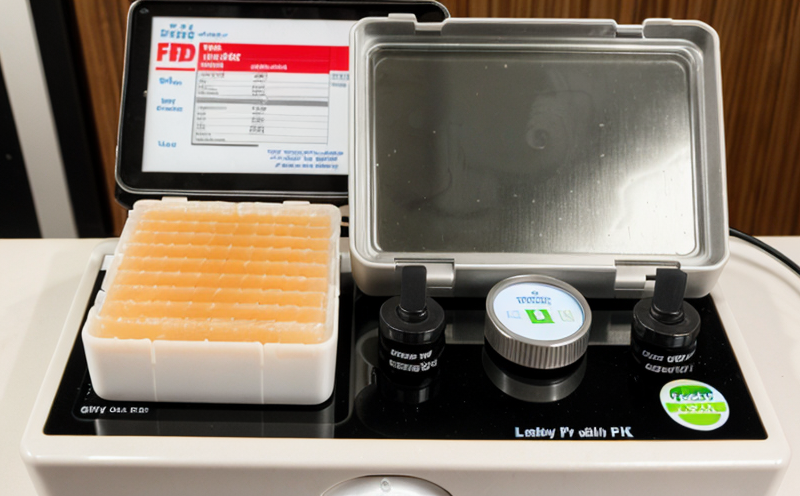EN 16888 Fatty Acid Composition in Functional Drinks
The European standard EN 16888 specifies the method for determining the fatty acid composition of functional drinks. This test is crucial for quality managers, compliance officers, and R&D engineers who need to ensure that their products meet regulatory standards and consumer expectations regarding nutritional content.
Functional drinks are a growing segment in the beverage industry, targeting health-conscious consumers with various benefits such as increased energy or enhanced cognitive function. The fatty acid profile of these drinks can significantly influence their perceived quality and effectiveness. Understanding and accurately measuring this profile is essential for product development, compliance with regulations like EU directives on food additives and contaminants, and maintaining brand reputation.
The process involves extracting fatty acids from the functional drink sample using a solvent followed by derivatization to convert them into volatile compounds suitable for gas chromatography analysis. The GC-MS (Gas Chromatography-Mass Spectrometry) technique is then employed to identify and quantify each individual fatty acid present in the sample.
Accurate measurement of fatty acids helps determine the nutritional value of functional drinks, ensuring compliance with labeling requirements as stipulated by European regulations such as Regulation (EC) No 1925/2006 on nutrition and health claims made on foods. It also aids in identifying potential allergens or contaminants that may affect consumer safety.
Properly conducted EN 16888 tests provide valuable data for R&D teams to optimize formulations, improve product performance, and enhance market appeal. By accurately measuring fatty acids, manufacturers can better understand how these components contribute to the overall health benefits advertised in their marketing materials.
Furthermore, knowing the exact fatty acid composition allows companies to comply with sustainability initiatives aimed at reducing environmental impact by minimizing waste production while maximizing resource efficiency throughout the supply chain.
- Reduces unnecessary packaging material usage
- Aids in selecting sustainable raw materials for ingredient sourcing
- Supports lifecycle assessments of products through accurate composition data
In summary, EN 16888 plays a vital role in safeguarding consumer health and promoting responsible business practices within the functional drink industry. Its implementation ensures that all claims made about the nutritional content of these beverages are backed by scientific evidence derived from precise analytical methods.
Why It Matters
The importance of accurate fatty acid composition analysis cannot be overstated when it comes to functional drinks. Compliance with relevant regulations is not just a legal requirement but also essential for maintaining consumer trust and ensuring product safety.
- Regulatory Compliance: Ensures adherence to EU directives on food additives, contaminants, and nutrition labeling requirements.
- Consumer Trust: Builds confidence among health-conscious consumers who rely on functional drinks to meet specific dietary needs or improve their well-being.
- R&D Optimization: Provides insights into the relationship between fatty acids and product efficacy, guiding formulation adjustments based on scientific evidence.
- Sustainability: Helps reduce waste by optimizing ingredient use and selecting more environmentally friendly packaging options.
By providing reliable data through EN 16888 testing, laboratories like Eurolab contribute to the creation of safer, healthier, and more sustainable products in the functional drink market.
Eurolab Advantages
At Eurolab, we pride ourselves on delivering accurate, reliable, and timely results for EN 16888 testing of fatty acid composition in functional drinks. Our team comprises experts with extensive experience in this field, ensuring that every test meets the highest quality standards.
- Experienced Professionals: Our scientists have deep knowledge of both theoretical principles and practical applications of GC-MS technology used in EN 16888 testing.
- State-of-the-Art Equipment: We utilize cutting-edge instruments capable of providing precise measurements even for trace amounts of fatty acids.
- Comprehensive Reporting: Each test comes with detailed reports including raw data, calculated percentages, and interpretation comments tailored to meet individual client needs.
- Prompt Turnaround Times: We aim to deliver results within industry benchmarks without compromising accuracy or completeness of the analysis.
In addition to technical excellence, Eurolab offers personalized service designed around your specific requirements. Whether you need routine testing for ongoing quality control purposes or one-off assessments prior to introducing new products into the market, our flexible approach ensures seamless integration with existing workflows.
Environmental and Sustainability Contributions
The practice of measuring fatty acid composition in functional drinks through EN 16888 contributes positively to environmental sustainability efforts. Here are some ways:
- Reduced Waste: Accurate ingredient selection based on fat content leads to less waste during production processes.
- Sustainable Ingredient Sourcing: Understanding the lipid profile helps choose raw materials that align with broader sustainability goals.
- Lifecycle Assessment Support: Precise composition data supports more thorough lifecycle assessments, aiding in informed decision-making regarding product development and environmental impact reduction strategies.
By leveraging EN 16888 testing, Eurolab assists clients in making informed choices that balance business objectives with ecological responsibility. This aligns perfectly with the growing trend towards eco-friendly practices across industries.





